9 Ways to Keep Reading and Spelling Lessons Motivating
A happy, nurturing environment is essential to a pleasant educational experience. But when your child is frustrated and dragging her feet, no one is learning … and no one is happy! Thankfully, there are several things you can do to encourage an upbeat and motivating atmosphere for reading and spelling lessons. These nine tips will help you keep your child’s reading and spelling lessons motivating—starting today!
-
Work at your child’s level

It’s important to select the appropriate level of reading or spelling instruction for your child. If you start at a level that is above your child’s head, he’ll start out feeling as if he’s already behind, which can promote feelings of inadequacy and stress caused by your child’s inability to perform up to the level expected. Try to avoid focusing on grade level—in fact, let go of grade levels. If your child needs to learn the rules for adding Silent E, go back to that lesson, no matter what “grade” he’s in.
-
Set small, attainable goals
Part of setting up your child for success is providing opportunities for frequent success. It is very motivating to reach a goal, and small successes will lead to more successes. For example, in AAR and AAS we teach just ONE concept at a time, allowing the child to be successful before moving on to the next concept.
-
Set your child up for success

Don’t even think about sitting down for a reading or spelling lesson if your child is cranky, hungry, or full of pent-up energy! Go for a brisk walk around the block or send the kids outside for a 10-minute recess. Have a high-protein snack to keep the brain energy up, and get the good endorphins working in your child’s favor. Starting lessons on the right foot will help your child be more receptive to learning—and enjoying!—the new material.
-
Keep things fun
Make lesson times fun and engaging. All About Reading and All About Spelling were written with this in mind. Both programs use hands-on activities that are way more fun than the typical boring worksheets found in many programs. But these multisensory activities aren’t just fun—they will also help your child learn and retain the skills and concepts presented in the lessons. It’s fun with a purpose!
-
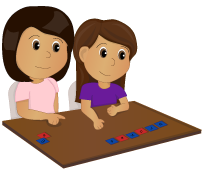
Tailor your responses to your child’s specific errors. For example, if your child misspells a word that you feel he should have been able to spell, ask him to self-check his spelling to see if he can spot the mistake on his own. Or if your child reads a word with incorrect pronunciation, remind your child to “pronounce for spelling.” Review any skill or concept that is applicable to the situation or try working out the problem together with letter tiles.
-
Use charts to show progress
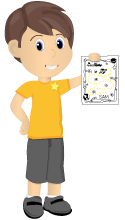
It’s motivating to see where you’ve been and how much progress you and your child have made together. Take the time to track your advancement on the All About Reading and All About Spelling Progress Charts and celebrate each accomplishment accordingly. Make cupcakes, go to the beach, or visit Grandma—small celebrations can commemorate the occasion and provide incentive and excitement for future lessons.
-
Avoid negative comments
As motivating as the progress chart can be, you can just as quickly put a damper on your child’s enthusiasm by making negative comments during lesson time. Take steps to minimize negativity, and avoid expressing your own frustration or impatience with your child. Stay away from phrases such as:
“You’re not trying.”
“I’ve already taught this to you!”
“I don’t think you’ll ever get this!”
“Just concentrate.”
These types of negative comments are never effective. No child ever thinks to himself, “Oh, you’re right. I will improve my concentration right now.” Instead, these phrases build frustration and resentment toward the lesson, and part of your child’s brain shuts down. Give a hug, take a break, and come back to the lesson later when both of you are ready to approach the lesson with a fresh perspective and your customary enthusiasm.
-
Point out the positive

A friendly, supportive teacher draws frequent attention to a child’s achievements, and doesn’t become bogged down in perpetually pointing out the child’s shortcomings or mistakes. Make it a point to regularly praise your child’s good work and progress, which will build your child’s confidence and encourage him to strive for further success. During your spelling lessons, include positive phrases such as:
“Very good! You are a quick learner!”
“You remembered that from yesterday—great!”
“Way to go!”
“Excellent—you did so well!”
“You are doing great!”
Our blog post on encouraging words gives many more examples and includes a free downloadable poster as a reminder.
-
Always end a lesson on a positive note
If your child is struggling with a concept, don’t end the lesson at the point of frustration. Back up to a point where the student can be successful, then spend a few minutes there before bringing the lesson to a close.
The way you approach reading and spelling lessons can have a huge effect on your child’s motivation. When you use the All About Reading and All About Spelling programs, tips for building motivation are built right into the lesson plans, making it easy for your kids to stay on track, stay motivated, and stay enthused about learning.
Do you have a tip for keeping reading and spelling lessons motivating? Please share it in the comments below!




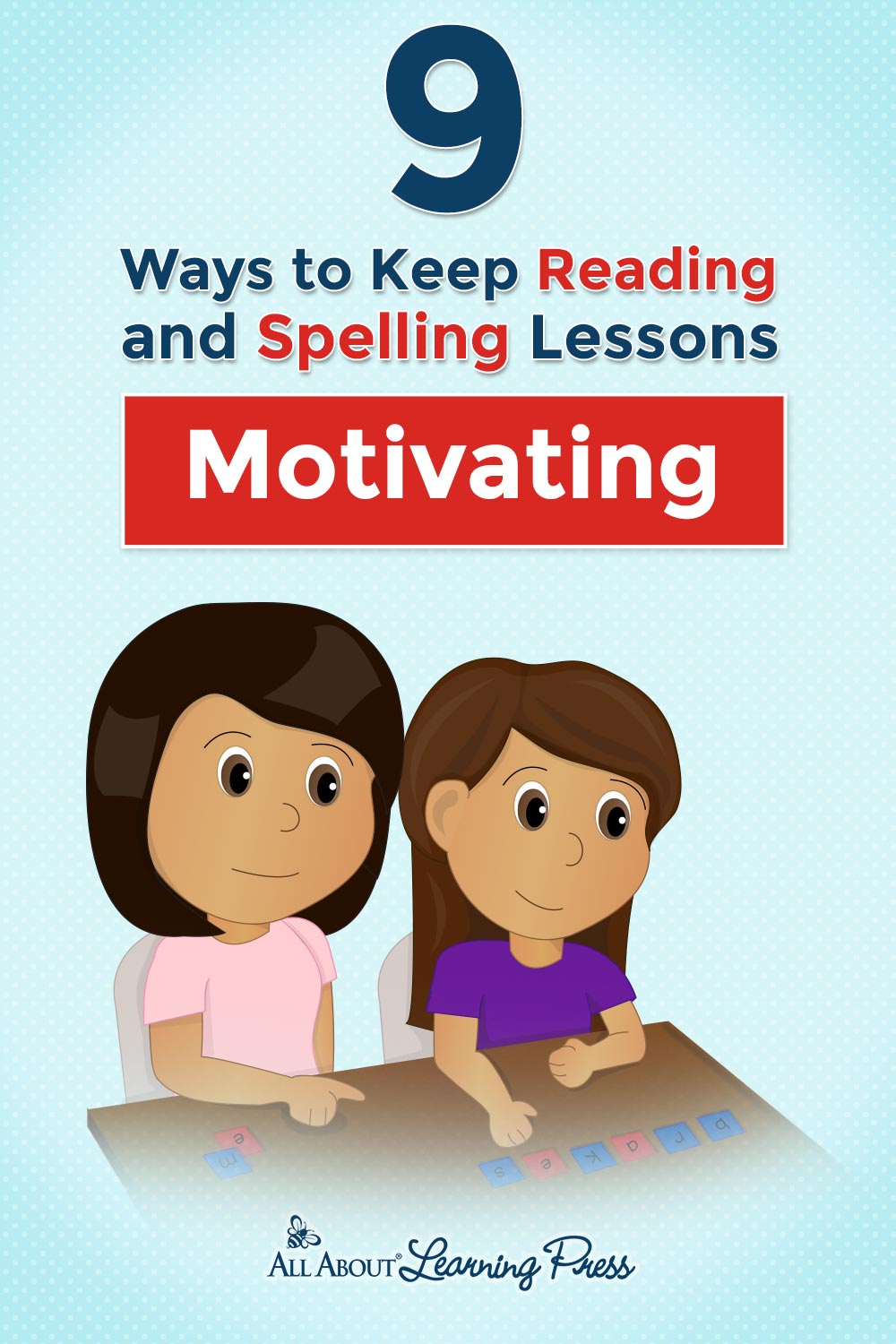





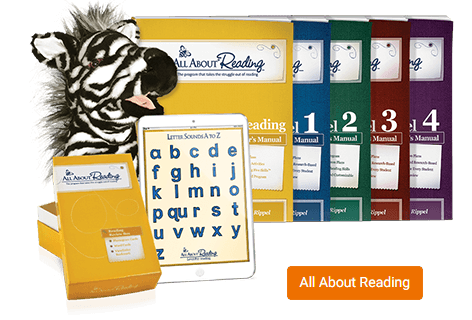
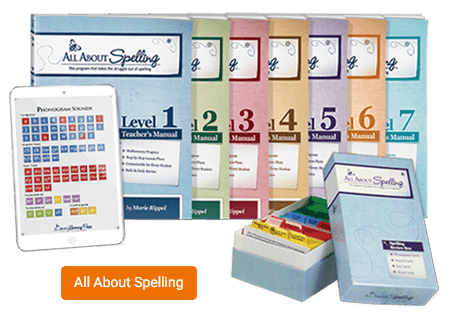
zoritoler imol
says:We are a group of volunteers and starting a new scheme in our community. Your website provided us with valuable info to work on. You have done a formidable job and our whole community will be thankful to you.
Ashley W
says:I love All About Reading. Your teacher’s manuals are invaluable! The tips and reminders for me make it worth every penny. Your customer service is top notch! And your freebies and blog are amazing.
Robin E.
says: Customer ServiceThank you, Ashley! It’s exciting to hear that All About Reading is working so well for you and that we have been able to provide good customer service.
Anita
says:Thank you for these great tips! I need to work on being more positive for my children.
Robin E.
says: Customer ServiceYou’re welcome, Anita. I hope these tips will be a lot of help for you.
Lindsey
says:Yikes, I’m guilty of saying “you’re not trying” sometimes but he isn’t trying sometimes. He starts guessing. Still, we never get very far when I say things like that and the guessing is usually a sign that he is tired and ready to call it quits for the day. Thanks for these tips!
Robin E.
says: Customer ServiceGreat observation, Lindsey! Yes, when children usually try but then start guessing or seemingly giving up, it is often a clear sign that they are fatiguing. Coming back the next day is often the best approach; tired children aren’t able to learn much.
Tammy
says:Thank you for sharing these helpful tips!
Robin E.
says: Customer ServiceYou’re welcome, Tammy!
Juliana
says:Great suggestions!! Thank you
Robin E.
says: Customer ServiceYou’re welcome, Juliana!
Tami Draper
says:“Make lesson times fun and engaging. All About Reading and All About Spelling were written with this in mind. “. This is a good reminder….thank you!
Robin E.
says: Customer ServiceYou’re welcome, Tami!
Liz Hansen
says:Keeping things fun is so important! I try to always finish with a fun activity or game and that helps with the last point in finishing on a positive note too.
I also talk to new students about my journey in learning to read and write because I also had difficulties at Primary School. I sometimes share stories of famous people with dyslexia etc too, I think it is important that kids have hope and role models that have been through what they have.
Robin E.
says: Customer ServiceSuch great suggestions, Liz! Thank you.
Yes, it is so important for students to understand that learning is hard for many people. Too often, struggling learners think it is only themselves, so hearing about others that once struggled and are now successful can be very encouraging.
And finishing a lesson on a fun activity is a wonderful way to have students excited for the next lesson!
Aimee
says:This article is a good reminder to keep reading fun and positive! And using the charts to show progress is a great motivator to my kids.
Robin E.
says: Customer ServiceThank you, Aimee! Yes, many children are very motivated by progress charts.
Suzanne Gregory
says:I love this idea! I know that my students love working with anything erasable as errors can just disappear and at the end everything is all correct!
Robin E.
says: Customer ServiceSo true, Suzanne! A perfect finished product is very rewarding, and no one needs to know that it took some work to get to error-free.
Nicole Sever
says:These are such great reminders about what works best for children! These are things that help students with ADHD and other learning differences and it’s great practice to implement them in various settings. I have saved this post to refer to often before planning and starting sessions!
Robin E.
says: Customer ServiceI’m glad this post was helpful, Nicole!
Heather
says:Great tips! I’m glad I found this article.
Robin E.
says: Customer ServiceI’m glad this was helpful for you, Heather!
SLee
says:ugh, thanks for the reminders, definitely need to work on not saying these negatives and adding more encouraging positives.
Vidhya
says:Fantastic strategies. Setting attainable goals and letting go of grade levels – unlearn and Relearn happened for me. Thanks you
Emily Mathew
says:Thanks for the excellent encouragement and reminders on helping a lesson be positive and strong!
Rita Bodiford
says:I’ve found that there is an enormous improvement in encouragement if you reply, “Almost…” rather than a negative response. There is always something the child did right to build on.
Robin E.
says: Customer ServiceSuch a great suggestion, Rita! Thank you.
Rebecca
says:It’s so important to be positive!
Dacia
says:Very helpful. Thank you!
Catherine Benedict
says:These were super helpful. Thank yiu
Carrie
says:Looks like a wonderful program, looking forward to giving it a try.
Gail
says:Thank you for these tips. My children are starting to drag and we start lessons cranky and hungry. I think our sessions will be much better implementing these suggestions. Thank you!
Greta
says:Charting progress makes a world of difference! It is a visual reminder to the child of how far we’ve come. It almost makes it like a game because kids can see their progress like they do on video games!
Mel K
says:When we started with All About Spelling a timer helped our student focus. They worked hard for the set time and we stopped as soon as the chime sounded. They didn’t get frustrated by long lessons.
Faith Whitley
says:These are some great reminders. Thank you
Brittany
says:I feel like I need to print this and refer to it throughout the year (actually, I think I’ll stick it in my AAR binder)- thank you!
Robin E.
says: Customer ServiceYou’re welcome, Brittany. Putting it in your binder is a great idea!
Serena
says:I really appreciate the last tip. Ending something on a high note makes it a lot easier to go back to next time.
Robin E.
says: Customer ServiceYes, so true, Serena. Not only does the student benefit from ending a lesson on a positive, but the teacher benefits too. Our perception of how learning is going is often influenced most by how a lesson ends.
Brandi
says:This was very helpful for me. As a new homeschooling family it has been a struggle to get my son excited to do school at home.
I will definitely keep these 9 helpful tips in mind when doing our daily school work.
Robin E.
says: Customer ServiceI’m glad this was helpful for you, Brandi. However, if you need more ideas or have concerns, let us know. We’re happy to help!
Judith Martinez
says:I love the “pronounce for spelling” suggestion as well as the idea to go back and review an earlier concept to end the lesson on a successful note.
Sarah
says:These all make sense but I just hadn’t thought about them.
Sarah
says:These are great ideas!